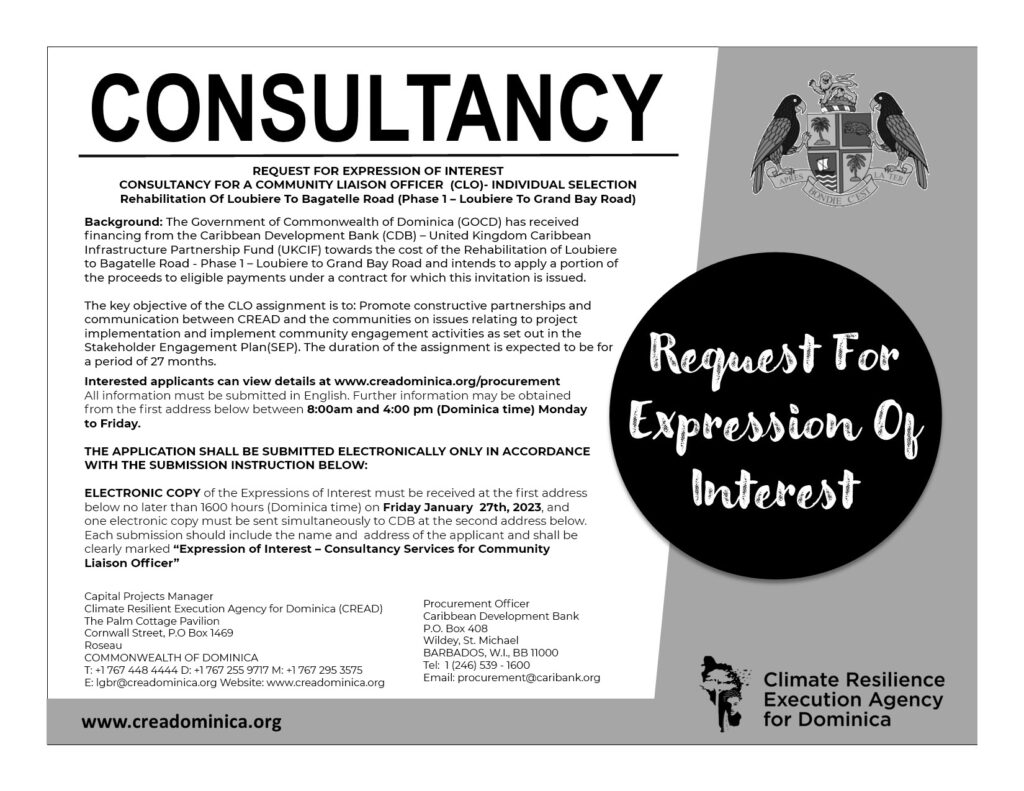
TERMS OF REFERENCE
COMMUNITY LIAISON OFFICER
- BACKGROUND
1.01 The Government of the Commonwealth of Dominica (GOCD) wishes to engage the consultancy
services of a Community Liaison Officer (CLO) to function within CREAD to support the implementation
of the Rehabilitation of Loubiere to Bagatelle Road, Phase I – Loubiere to Grand Bay Road (The Project).
CREAD will be responsible for the management and implementation of the Project –financed by the
Caribbean Development Bank (CDB).
1.02 The Project’s impact is increased climate resilience, sustainability and connectivity of the
Dominica’s transportation infrastructure and improved living conditions and livelihood opportunities for residents in the rural communities. This objective is expected to yield the following outcomes:
(a) enhanced decision-making capacity for planning, management and maintenance of the road
sector; and
(b) increased efficiency, resilience and safety along Loubiere to Grand Bay Road.
1.03 The CLO shall report directly to the Senior Capital Projects Manager (SCPM), of CREAD or
his/her designate.
1.04 There are significant benefits to be realised from the Project but there are also a range of social
and environmental safeguard issues that were identified through the Environmental and Social ImpactAssessment (ESIA) which must be managed during implementation. In this regard, the engagement of a Community Liaison Officer (CLO) is imperative to support the SCPM in managing the safeguard aspects of the Project. This critical input is intended to increase the likelihood of realising the project’s intended outcomes. - SCOPE OF SERVICES
2.01 The CLO will promote constructive partnerships and communication between CREAD and the
communities on issues relating to project implementation and will be responsible for implementing
community engagement activities as set out in the Stakeholder Engagement Plan (SEP). Among other
activities, CLO will:
(a) Review SEP with a view to identifying and documenting any gaps in the (i) stakeholder
identification and analysis that were undertaken; (ii) stakeholder engagement programme
(e.g., information to be disclosed, format and communication methods; stakeholder
consultation methods); and (iii) schedule for the various stakeholder engagement activities.
Information in the ESIA should be used to support SEP review and implementation. The
SEP must be updated to address any gaps identified;
(b) Maintain updates to SEP as necessary, based on issues arising during implementation that
may include inter alia, stakeholder engagement, and land acquisition. Any major changes
to the project activities and/or schedule will be duly reflected in the updated SEP.
(c) Provide timely feedback to SCPM on concerns raised by community leaders.
(d) Provide timely feedback to community members on project implementation, concerns
raised or important decisions taken by CREAD in accordance with agreed protocols.
(e) Develop public relations programmes along with CREAD and the Gender Responsive and
Socially Inclusive Road Safety Awareness Strategy Consultant, Non-Governmental
Organisations, and Community-based Organisations to educate community members about
the project and encourage their continuous buy-in and active participation throughout the
project cycle.
(f) Facilitate dialogue and sensitise Project-affected communities as necessary, with particular
attention being paid to obtaining information from the less vocal persons in the
communities through the use of differential participatory techniques.
(g) Manage community members’ expectations of the project during scheduled meetings and
ad-hoc interaction, as necessary.
(h) Identify potential grievances or project risks and/or opportunities.
(i) Assist CREAD with management of, and timely responses to grievances lodged through
the Grievance Redress Mechanism of the SEP.
(j) Liaise with contractors as needed (e.g. during the local labour recruitment process by
assisting with drafting gender-responsive local hiring policies and procedures) especially
where community requirements are being solicited.
(k) Raise awareness of employment opportunities, especially for vulnerable groups in the
society and within the Project areas including women, youth and Persons with
Disabilities (PWDs).
(l) Manage stakeholder engagement logistics such as soliciting suggestions/grievances from
suggestion boxes, placing communication materials on notice boards and via social media,
and arranging community meetings.
(m) Facilitate stakeholder participation at all relevant levels in accordance with the identified
needs of the different categories of stakeholders, particularly women, youth, and PWDs.
This may include other activities – participatory assessments and problem-solving of
issues, concerns and opportunities, focus group discussions, information-sharing, and
community meetings.
(n) Assist Resettlement Action Committee with management of, and timely responses to
grievances lodged through the Grievance Redress Mechanism of the SEP.
(o) Implementation and, where appropriate, to the proposal of modifications to the
RAP (for consideration by the social specialist) during implementation in
consultation with the Ministry of Housing and Lands.
(p) Assist in evaluating the social, environmental and economic impacts of Project activities
on the well-being of community members using participatory approaches.
(q) Monitor implementation of the recommendations proposed under the Consultancy –
“Gender Responsive and Socially Inclusive Road Safety Awareness Strategy” and
participation in training activities.
(r) Assist SCPM in ensuring that the implementation of project activities is in conformance
with GOCD’s and CDB’s environmental and social requirements.
(s) Attend Project Steering Committee meetings as required and provide information on
community discussions, highlighting any current and/or potential challenges likely to
impact implementation progress.
(t) Maintain comprehensive and updated minutes of meetings with the community and other
stakeholders.
(u) Prepare and submit to SCPM inputs for incorporation into monthly progress reports to
CDB.
(v) Prepare and submit to SCPM, inputs for incorporation into a Project Completion Report
(PCR), within three months after practical completion of the works.
(w) Promote and conduct awareness training on health and safety risks directly associated with
the Project. These should include but not be limited to mitigating potential conflicts
between any foreign workers and local communities that may arise from an influx of
workers to the Project sites during construction, increased risks of harmful practices such
as sex work, gender-based violence and the use of illegal drugs. - DURATION
3.01 The consultancy is expected to last approximately twenty-seven (27) months from the date of
contract signing. - REPORTS/DELIVERABLES
4.01 CLO shall report to the SCPM. CLO will furnish reports/deliverables on the assignment as set out
below:
(a) Prior to commencement of the works, develop and implement a results-based, gendersensitive M&E framework/plan for the SEP that monitors the implementation of SEP and
includes the following indicators:
(i) number of consultation meetings and other public discussions (forums, focus
groups, etc.) conducted within a reporting period. The reporting period will be
defined in the framework (e.g. monthly, quarterly, or annually);
(ii) % of women participating in consultations by reporting period;
(iii) number of grievances received within a reporting period, number of those resolved
within the prescribed timeline, disaggregated by sex of the complainant; and
(iv) number of project-related press materials published /broadcasted in the national
media.
(b) Other information to be collected shall include:
(i) Geographic origin and type of grievances received, and reasons for non-resolution
within the prescribed timeline including an analysis of trends.
(ii) Analysis of project-related press releases content: proportion that is favourable,
unfavourable, neutral, and trends.
(c) Provide a monthly (structured) field report to CREAD including consultations undertaken,
attendance registers (where applicable), concerns raised, requests raised, concerns
resolved, potential risks, grievances or opportunities identified;
(d) Assist in compiling a quarterly report for external stakeholders on stakeholder engagement
activities undertaken during the previous quarter including the current status of M&E
actions. The quarterly report shall include summarised information on participatory
methods employed, grievances received from stakeholders (including information on
incidents and events that resulted in grievances) and will be collated by the responsible
staff and referred to the SCPM. These summaries will be accompanied by information on
the implementation status of associated corrective and preventative actions and
recommendations. This report shall form part of the quarterly status reporting (provided
by SCPM) for the Project; and
(e) Assist in the compilation of relevant sections of the PCR. - QUALIFICATIONS AND EXPERIENCE
5.01 CLO is expected to possess the following minimum qualifications:
(a) A Bachelor’s Degree (Master’s is preferable) in Sociology, Rural Development,
Anthropology, International Development, Community Development or other relevant
discipline.
(b) A minimum of seven years’ relevant practical experience encompassing stakeholder
engagement practice, community development, and/or social research using participatory
methodologies.
(c) Fluency in English is required.
(d) Proficient computer skills and good written and oral communication skills are required.
(e) Administrative and management competence would be an asset.











